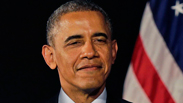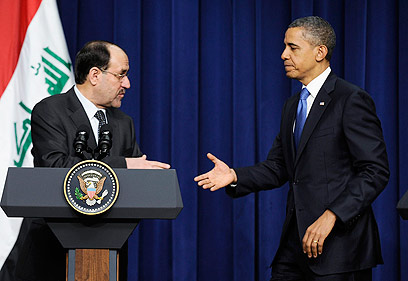
Barack Obama
Photo: AP
President Barack Obama threatened US military strikes in Iraq on Thursday against Sunni Islamist militants who have surged out of the north to menace Baghdad and want to establish their own state in Iraq and Syria.
Iraqi Kurdish forces took advantage of the chaos to take control of the oil hub of Kirkuk as the troops of the Shiite-led government abandoned posts, alarming Baghdad's allies both in the West and in neighboring Shiite regional power Iran.
Related stories:
- US looking at options to deter Iraq insurgency
- Syria heartened by Obama's plan for Iraq, envoy says
- Iraq and President Obama
"I don't rule out anything because we do have a stake in making sure that these jihadists are not getting a permanent foothold in either Iraq or Syria," Obama said at the White House when asked whether he was contemplating air strikes. Officials later stressed that ground troops would not be sent in, however.
Obama was looking at "all options" to help Iraq's leaders, who took full control when the US occupation ended in 2011. "In our consultations with the Iraqis there will be some short-term immediate things that need to be done militarily," he said.
But he also referred to longstanding US complaints that Shiite prime minister Nuri al-Maliki had failed to do enough to heal a sectarian rift that has left many in the big Sunni minority, shut out of power when US troops overthrew Saddam Hussein in 2003, nursing grievances and keen for revenge.
"This should be also a wakeup call for the Iraqi government. There has to be a political component to this," Obama said.
Vice President Joe Biden assured Maliki by telephone that Washington was prepared to intensify and accelerate its security support. The White House had signaled on Wednesday that it was looking to strengthen Iraqi forces rather than meet what one US official said were past Iraqi requests for air strikes.
With voters wary of renewing the military entanglements of the past decade, Obama last year stepped back from launching air strikes in Syria, where the same Sunni group - the Islamic State of Iraq and al Sham (ISIS) – is also active. Fears of violence spreading may increase pressure for international action, however. The French foreign minister, Laurent Fabius, said international powers "must deal with the situation".
In Mosul, ISIS staged a parade of American Humvee patrol cars seized from a collapsing Iraqi army in the two days since its fighters drove out of the desert and overran the city.
At Baiji, near Kirkuk, insurgents surrounded Iraq's largest refinery, underscoring the potential threat to the oil industry, and residents near the Syrian border saw them bulldozing tracks through frontier sand berms – giving physical form to the dream of reviving a Muslim caliphate straddling both modern states.
Air power
At Mosul, which had a population close to 2 million before recent events forced hundreds of thousands to flee, witnesses saw ISIS fly two helicopters over the parade, apparently the first time the militant group has obtained aircraft.It was unclear who the pilots were, but Sunnis who served in the forces of Saddam have rallied to the insurgency, led by an ambitious Iraqi former follower of al-Qaeda's Osama bin Laden.
State television showed what it said was aerial footage of Iraqi aircraft firing missiles at insurgent targets in Mosul. The targets could be seen exploding in black clouds.
Further south, the fighters extended their lightning advance to towns only about an hour's drive from the capital, where Shiite militia are mobilizing for a potential replay of the ethnic and sectarian bloodbath of 2006-2007.
Trucks carrying Shiite volunteers in uniform rumbled towards the front lines to defend Baghdad.
The forces of Iraq's autonomous ethnic Kurdish north, known as the peshmerga, took over bases in Kirkuk vacated by the army, a spokesman said: "The whole of Kirkuk has fallen into the hands of peshmerga," said peshmerga spokesman Jabbar Yawar.
"No Iraqi army remains in Kirkuk now."
Kurds have long dreamed of taking Kirkuk and its huge oil reserves. They regard the city, just outside their autonomous region, as their historic capital, and peshmerga units were already present in an uneasy balance with government forces.
The swift move by their highly organized security forces to seize full control demonstrates how this week's sudden advance by ISIS has redrawn Iraq's map – and potentially that of the entire Middle East, where national borders were set nearly a century ago as France and Britain carved up the Ottoman empire.
Since Tuesday, black-clad ISIS fighters have seized Mosul and Tikrit, Saddam's home town, and other towns and cities north of Baghdad. The army has evaporated before the onslaught, abandoning bases and US-provided weapons. Online videos showed purportedly a column of hundreds, possibly thousands, of troops without uniforms being marched under guard near Tikrit.
Security and police sources said Sunni militants now controlled parts of the town of Udhaim, 90 km (60 miles) north of Baghdad, after most of the army troops left their positions.
"We are waiting for reinforcements, and we are determined not to let them take control," said a police officer in Udhaim.
"We are afraid that terrorists are seeking to cut the main highway that links Baghdad to the north."
ISIS and its allies took control of Falluja at the start of the year. It lies just 50 km west of Maliki's office.
Oil price surge
The top UN official in Iraq assured the Security Council the capital was in "no immediate danger". The Council offered unanimous support to the government and condemned "terrorism".As with the back-to-back war in Syria, the conflict cuts across global alliances. The United States and Western and Gulf Arab allies back the mainly Sunni revolt against Iranian-backed Syrian President Bashar al-Assad but have had to watch as ISIS and other Islamists have come to dominate large parts of Syria.
Now the Shiite Islamic Republic of Iran, which in the 1980s fought Saddam for eight years at a time when the Sunni Iraqi leader enjoyed quiet US support, may share an interest with the "Great Satan" Washington in bolstering mutual ally Maliki.
The global oil benchmark jumped over 2 percent on Thursday, as concerns mounted that the violence could disrupt supplies from the OPEC exporter. Iraq's main oil export facilities are in the largely Shiite areas in the south and were "very, very safe", oil minister Abdul Kareem Luaibi said.
ISIS fighters have overrun the town of Baiji, site of the main oil refinery that meets Iraq's domestic demand for fuel. Luaibi said the refinery itself was still in government hands but late on Thursday police and an engineer inside the plant said insurgents were surrounding it.
Militants have set up military councils to run the towns they captured, residents said. "They came in hundreds to my town and said they are not here for blood or revenge but they seek reforms and to impose justice. They picked a retired general to run the town," said a tribal figure from the town of Alam.
"'Our final destination will be Baghdad, the decisive battle will be there,' – that's what their leader kept repeating."
Security was stepped up in Baghdad to prevent the Sunni militants from reaching the capital, which is itself divided into Sunni and Shiite neighborhoods and saw ferocious sectarian street fighting in 2006-2007 under US occupation.
By midday on Thursday insurgents had not entered Samarra, the next big city in their path on the Tigris north of Baghdad.
"The situation inside Samarra is very calm today, and I can't see any presence of the militants. Life is normal here," said Wisam Jamal, a government employee in the mainly Sunni city, which also houses a major Shiite pilgrimage site.
Low morale
The million-strong Iraqi army, trained by the United States at a cost of nearly $25 billion, is hobbled by low morale and corruption. Its effectiveness is hurt by the perception in Sunni areas that it pursues the hostile interests of Shiites.The Obama administration had tried to keep a contingent of troops in Iraq beyond 2011 to prevent a return of insurgents, but failed to reach a deal with Maliki. A State Department official said on Thursday that Washington was disappointed after "a clear structural breakdown" of the Iraqi forces.
Iraq's parliament was meant to hold an extraordinary session on Thursday to vote on declaring a state of emergency, but failed to reach a quorum, a sign of the sectarian political dysfunction that has paralyzed decision-making in Baghdad.
The Kurdish capture of Kirkuk overturns a fragile balance of power that has held Iraq together since Saddam's fall.
Iraq's Kurds have done well since 2003, running their own affairs while being given a fixed percentage of the country's overall oil revenue. But with full control of Kirkuk – and the vast oil deposits beneath it - they could earn more on their own, eliminating the incentive to remain part of a failing Iraq.
With Syria's Kurds already exploiting civil war there to run their own affairs, Iraqi Kurdish expansionism could worry US ally Turkey, which has its own large Kurdish minority and fears a renewed attempt to redraw borders and create a Kurdish state.
Maliki's army already lost control of much of the Euphrates valley west of the capital to ISIS last year, and with the evaporation of the army in the Tigris valley to the north, the government could be left with just Baghdad and areas south – home to the Shiite majority in Iraq's 32 million population.
Iran, which funds and arms Shiite groups in Iraq, could be brought deeper into the conflict, as could Turkey to the north, also home to a big Kurdish minority. In Mosul, 80 Turks were held hostage by ISIS after Ankara's consulate there was overrun.
Maliki described the fall of Mosul as a "conspiracy" and said the security forces who had abandoned their posts would be punished. In a statement on its Twitter account, ISIS said it had taken Mosul as part of a plan "to conquer the entire state and cleanse it from the apostates" – meaning Shiites.
Militants were reported to have executed soldiers and policemen after their seizure of some towns.
ISIS, led by Abu Bakr al-Baghdadi, broke with al-Qaeda's international leader, Osama bin Laden's former lieutenant Ayman al-Zawahri, and has clashed with al-Qaeda fighters in Syria, often employing brutal methods against enemies.
In Syria, it controls swathes of territory, funding its advances through extorting local businesses, seizing aid and selling oil. In Iraq, it has carried out regular bombings against Shiite civilians, killing hundreds a month.
















